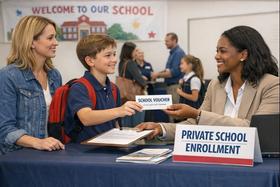What is a Safe School?
The idea behind a safe school is that you know your child will get into at least one of the schools on your shortlist. Let's start by reviewing the steps in the process.
1. Cast your net as widely as you want.
This is the fun part of the process.
Look at anything and everything. No holds barred. If a school in Dallas appeals to you, put it on the list. If one in Lakeville, Connecticut, floats your boat, add it to your list.
End up with 15-20 schools on your first list. Be sure to visit each one virtually. Most schools will have videos, so you can get an idea of what the schools are like by watching the videos. This is not a substitute for visiting a school. It's merely the first pass.
While this video discusses applying to safe colleges, the same reasoning applies to private high schools.
2. Create a shortlist of schools.
Now you have to determine which school or schools will be your safe school.
What exactly is a safe school? It's a school to which you have an excellent chance of being admitted. It's a school that perhaps is not as competitive as others on your list.
That is the challenge of the second step in this process. Determine as accurately as possible which schools are genuine reaches or where you have a tiny chance


























